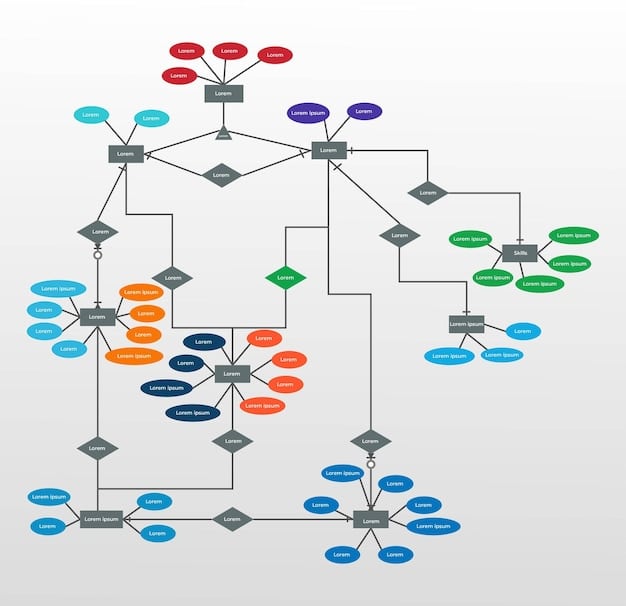Preventing Bribery & Corruption: A US Business Guide to the FCPA

Preventing bribery and corruption is crucial for US businesses, and the Foreign Corrupt Practices Act (FCPA) provides a legal framework to ensure ethical conduct in international dealings, focusing on transparency and accountability.
Navigating international business deals can be complex, especially when it comes to ethical conduct and legal compliance. Are you a US business looking to understand and implement effective measures for preventing bribery and corruption under the Foreign Corrupt Practices Act (FCPA)? This guide provides practical insights to help you ensure your business operates with integrity and avoids legal pitfalls.
Understanding the Foreign Corrupt Practices Act (FCPA)
The Foreign Corrupt Practices Act (FCPA) is a U.S. law enacted to address and deter bribery of foreign officials. It applies to U.S. persons and certain foreign issuers of securities. Understanding its core provisions is the first step in ensuring compliance.
The FCPA primarily focuses on two key areas:
Anti-Bribery Provisions
These provisions prohibit the payment or offer of anything of value to a foreign official to influence their actions, secure an improper advantage, or obtain or retain business.
Accounting Provisions
These provisions require companies to maintain accurate books and records and implement internal controls to prevent and detect FCPA violations.
- Who is Subject to the FCPA? The FCPA applies to U.S. citizens, residents, and companies, as well as foreign companies listed on U.S. stock exchanges.
- What Constitutes a Violation? A violation occurs when a payment or offer of anything of value is made with the intent to influence a foreign official.
- Penalties for Non-Compliance: Penalties can include significant fines, imprisonment for individuals, and debarment from government contracts.

Understanding these core aspects is crucial for businesses to establish a strong foundation for compliance. It is essential to accurately determine who is subject to the FCPA, the specific actions that constitute a violation, and the potential penalties for non-compliance.
Developing a Robust Compliance Program
A well-structured compliance program is your first line of defense against bribery and corruption. It’s not just about avoiding legal penalties; it’s about fostering a culture of ethics and integrity within your organization.
Key components of an effective compliance program include:
Risk Assessment
Identify areas in your business operations where bribery risks are highest. This might include interactions with foreign officials, dealings in high-risk countries, or involvement in industries prone to corruption.
Code of Conduct
Establish a clear and accessible code of conduct that outlines ethical expectations for all employees. The code should prohibit bribery and corruption explicitly and provide guidance on ethical decision-making.
Training and Education
Conduct regular training sessions to educate employees on the FCPA and the company’s compliance policies. Training should be tailored to specific roles and responsibilities, ensuring that employees understand how to identify and report potential violations.
Here are a few essential elements to consider when developing your program:
- Tone at the Top: Leadership must demonstrate a commitment to ethical behavior and compliance.
- Due Diligence: Conduct thorough due diligence on third-party partners, agents, and consultants.
- Reporting Mechanisms: Implement confidential reporting channels for employees to raise concerns without fear of retaliation.
Implementing a comprehensive compliance program not only mitigates legal risks but also reinforces a commitment to ethical conduct, enhancing your company’s reputation and long-term sustainability.
Conducting Due Diligence on Third Parties
In international business, you’ll often rely on third parties such as agents, distributors, and consultants to represent your interests. However, these relationships can also expose your company to FCPA risks if not managed carefully.
Therefore, conducting thorough due diligence on third parties is critical to ensuring they act ethically and legally on your behalf.
Background Checks
Perform comprehensive background checks to identify any red flags. This includes reviewing their reputation, past legal issues, and connections to government officials.
Contractual Safeguards
Include FCPA compliance clauses in contracts with third parties. These clauses should require them to adhere to your company’s ethical standards and provide the right to audit their activities.
Ongoing Monitoring
Continuously monitor third-party activities to ensure ongoing compliance. This might involve regular audits, reviews of their financial transactions, and communication to reinforce ethical expectations.
Key practices for effective due diligence:
- Document Everything: Maintain detailed records of your due diligence process.
- Risk-Based Approach: Focus your due diligence efforts on high-risk third parties and transactions.
- Update Regularly: Periodically review and update your due diligence processes to reflect changes in risk and regulations.
By implementing a robust due diligence process, you can minimize the risk of being held liable for the corrupt actions of your third-party partners.
Implementing Internal Controls
Internal controls play a vital role in preventing and detecting bribery and corruption. These controls are policies and procedures designed to safeguard your company’s assets and ensure the accuracy of financial records.
Strong internal controls can help you identify and address potential FCPA violations before they occur.
Accurate Books and Records
Maintain detailed and accurate books and records that reflect all transactions. This includes tracking payments to third parties, expenses, and other financial activities.
Segregation of Duties
Implement a system of segregation of duties to prevent any single individual from having too much control over financial transactions. This helps reduce the risk of fraud and error.
Auditing Procedures
Conduct regular internal audits to assess the effectiveness of your internal controls. These audits can help identify weaknesses and areas for improvement.
Essential elements of robust internal controls:
- Authorization Requirements: Establish clear authorization requirements for all payments and transactions.
- Expense Reimbursement Policies: Develop policies for expense reimbursement that prevent improper payments or gifts.
- Regular Reviews: Conduct regular reviews of your internal controls to ensure they remain effective and up-to-date.

By implementing and maintaining robust internal controls, you can create a more transparent and accountable organization, reducing the risk of FCPA violations and promoting ethical conduct.
Responding to FCPA Violations
Despite your best efforts, FCPA violations can still occur. Having a plan in place to respond quickly and effectively is crucial to mitigating the damage and minimizing penalties. When a violation is detected, prompt action is essential.
Key steps in responding to FCPA violations include:
Investigation
Conduct a thorough internal investigation to determine the nature and extent of the violation. This investigation should be independent and unbiased, involving legal counsel and forensic experts.
Reporting
Report the violation to the appropriate authorities, such as the Department of Justice (DOJ) and the Securities and Exchange Commission (SEC). Voluntary disclosure can often result in more lenient treatment.
Remediation
Take corrective action to address the underlying issues that led to the violation. This might include revising compliance policies, enhancing internal controls, and providing additional training.
Important considerations when responding to violations:
- Cooperate with Authorities: Be transparent and cooperative with government investigations.
- Document Your Response: Maintain detailed records of your investigation, reporting, and remediation efforts.
- Seek Legal Counsel: Consult with experienced legal counsel to guide you through the process.
By responding quickly and effectively to FCPA violations, you can demonstrate your commitment to compliance and mitigate the potential consequences.
Continuous Improvement and Monitoring
Compliance is not a one-time effort but an ongoing process. To ensure your FCPA compliance program remains effective, it’s essential to continuously monitor and improve it. Regular assessment and adaptation are essential.
Strategies for continuous improvement include:
Regular Audits
Conduct periodic audits to assess the effectiveness of your compliance program. These audits should be conducted by independent experts who can provide objective feedback.
Policy Updates
Regularly review and update your compliance policies to reflect changes in regulations and business practices. This ensures that your policies remain relevant and effective.
Feedback Mechanisms
Establish feedback mechanisms to gather input from employees and third parties. This can help identify areas where your compliance program can be improved.
Key elements for ongoing monitoring:
- Performance Metrics: Track key performance indicators (KPIs) to measure the effectiveness of your compliance efforts.
- Training Effectiveness: Assess the effectiveness of your training programs to ensure employees understand and adhere to compliance policies.
- Culture of Compliance: Foster a culture of compliance throughout your organization by reinforcing ethical expectations and providing ongoing support.
By embracing continuous improvement and monitoring, you can create a culture of compliance that promotes ethical behavior and reduces the risk of FCPA violations. This proactive approach not only protects your company from legal liabilities but also enhances your reputation and long-term success.
| Key Point | Brief Description |
|---|---|
| ✅ FCPA Basics | Understand anti-bribery and accounting provisions of the FCPA. |
| 🛡️ Compliance Program | Develop a robust program with risk assessment and code of conduct. |
| 🔎 Due Diligence | Thoroughly vet third parties engaging with your business overseas. |
| 🚨 Response Protocol | Establish a plan to efficiently address and report FCPA violations. |
Frequently Asked Questions (FAQ)
▼
The FCPA’s primary goal is to prevent US companies and individuals from bribing foreign officials to gain or retain business, promoting fair and ethical international business practices.
▼
A ‘foreign official’ includes employees or officers of a foreign government, political party, or any department, agency, or instrumentality thereof, extending to those acting in an official capacity.
▼
Penalties can include large fines (millions of dollars for companies, and substantial fines for individuals), imprisonment (up to 5 years), and debarment from government contracts.
▼
By establishing a comprehensive compliance program, regularly training employees, conducting thorough due diligence on third parties, and consistently monitoring and improving compliance efforts.
▼
Conduct an immediate internal investigation, report the violation to the appropriate authorities (DOJ/SEC), cooperate with official investigations, and take prompt corrective action to address the issues.
Conclusion
In conclusion, preventing bribery and corruption under the FCPA requires a proactive and comprehensive approach. By understanding the law, developing a robust compliance program, and continuously monitoring and improving your efforts, US businesses can operate ethically and maintain a strong, reputable presence in the global marketplace.





